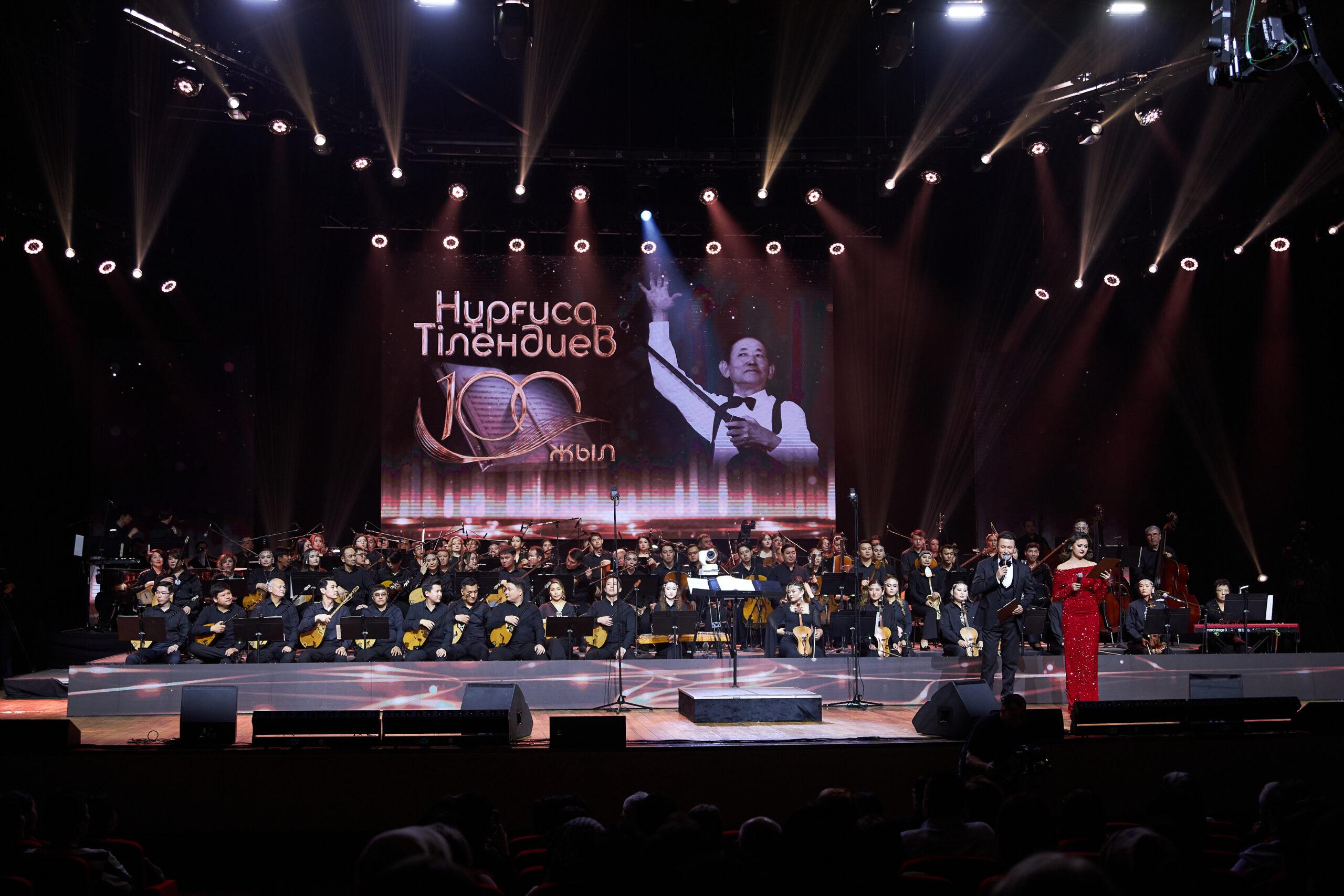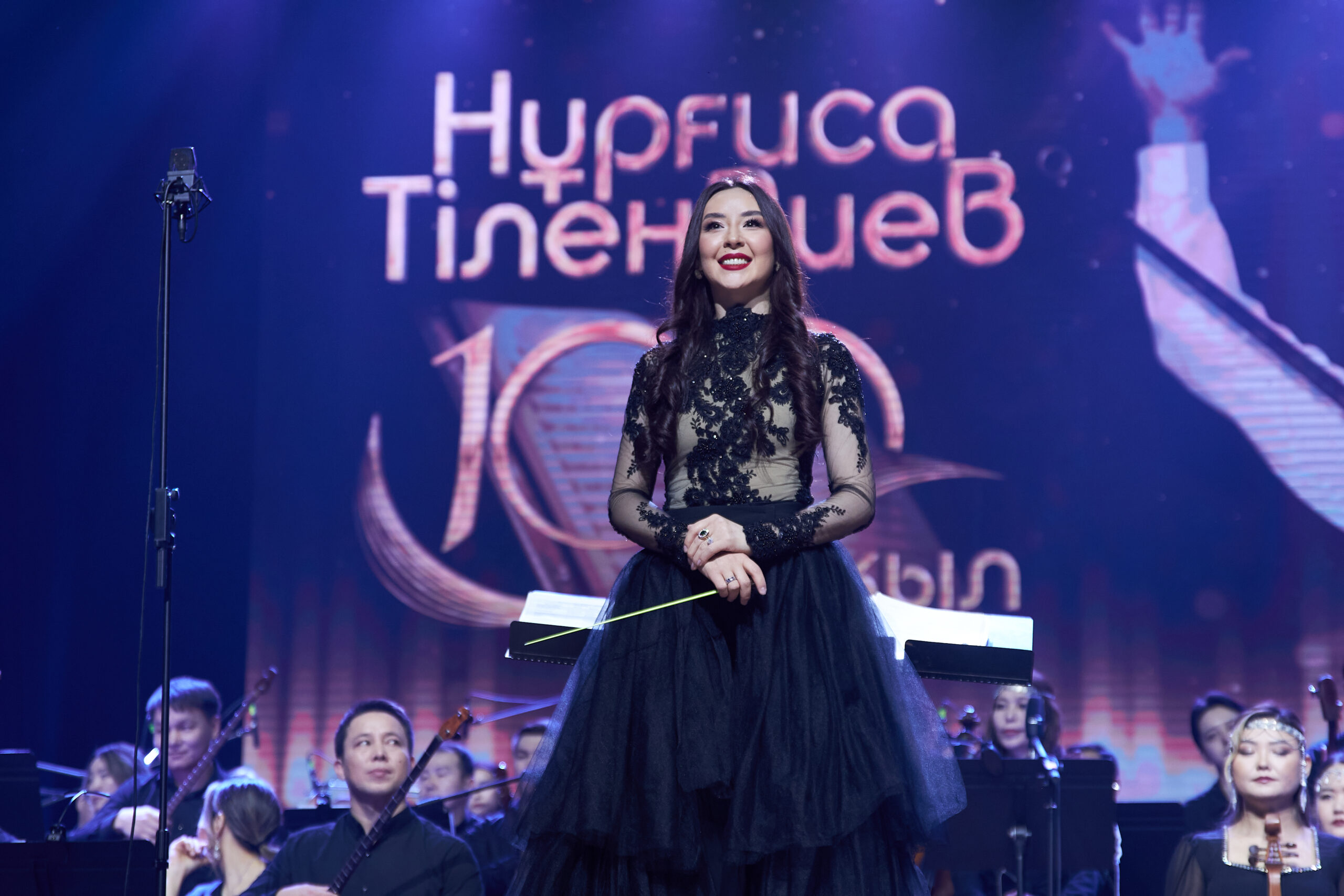ASTANA – Prominent Kazakh musicians led by the Otyrar Sazy folklore-ethnographic orchestra celebrated the 100th anniversary of Kazakh composer and conductor Nurgisa Tlendiyev with the best of his works at Qazaq Concert in Astana on April 1.

Opening ceremony of the anniversary Alkissa-Nurgisa concert dedicated to the 100th anniversary of the outstanding Kazakh composer Nurgisa Tlendiyev. Photo credit: Arman Eshmanov/Qazaq Concert
Tlendiyev was celebrated for his extraordinary talent as a composer, creating timeless melodies and orchestral works that resonate deeply with every Kazakh. Through Otyrar Sazy, he brought an exceptional variety of Kazakh instrumental color and texture into the classical orchestra.
The concert program featured well-known and beloved songs, such as “Karlygash” (Swallow Birds), “Ata Tolgau” (Father’s Song), and “Oz Elim” (My Homeland), along with kuis (traditional musical composition).
His daughter, Dinzukhra Tlendiyeva, continues her father’s legacy, serving as an artistic director and principal conductor of the Otyrar Sazy orchestra.
“I have been involved in music since I was a little girl. I still remember my father’s 70th birthday. It was held in 1995 at the [Abai Kazakh National] Opera and Ballet Theater. He was still alive then. He had a big celebration concert. The people almost broke the doors of the opera theater. Since then, this 100th anniversary is to be another important celebration,” Tlendiyeva told journalists ahead of the concert.
A skillful man created lasting relations with poets, musicians and writers. But Tlendiyeva recalls her father had high technical demands for musicians.

His daughter, Dinzukhra Tlendiyeva, now continues her father’s legacy, serving as an artistic director and principal conductor of the Otyrar Sazy orchestra. Photo credit: Arman Eshmanov/Qazaq Concert
“He was a strict man at work. He would fire a musician within half an hour and then hire someone back within half an hour. His character was constantly shifting. But at home, he was a good father and a good husband,” she said.
“His working style was very interesting because he was very excited about writing. His works often came out at night: at three or five o’clock. Then he would start calling his younger and older brothers, saying, ‘Why are you sleeping? I have such and such a work coming out.’
First, of course, he would wake up my mother. He would say, ‘Get up, Dakha [Dariga], get up – ‘Alqissa (referring to renowned kui) is coming out,’ my mother tells,” said Tlendiyeva.
Among her many memories of her father, it was his distinct writing style that stood out the most.
“When he wrote a piece, he would write it like a letter. Most people write with a pencil, erasing and refining as they go, but his music existed entirely in his head. He would start writing with a pen, like a letter. He would always have a score on the coffee table next to his bed and a cup. My mother would always pour tea into a large cup. He would drink the tea even when it had gone cold,” said Tlendiyeva.
Kazakh singer Zhubanysh Zheksenuly performed an eloquent account of Tlendiyev’s “Azheme” (To My Grandmother) song. Speaking to The Astana Times, he expressed confidence that Tlendiyev’s works will survive for many generations to come.
“I think that the songs of our Nurgisa ata [respectful reference to a person, translates as grandfather] are in our hearts, in the hearts of our parents, in the hearts of our grandparents. That is why these songs will last as long as the Kazakh people live. Those songs were written when the Kazakh music and song reached its peak,” he said.
“When I was a child, he came to our native village of Sozak with his Otrar Sazy orchestra. We were children at that time. In those years, he gave concerts and traveled around the country, and he also came to our Sozak. That was the first and the last time in my life that I saw him,” said Zheksenuly.
This concert marked the beginning of a series of celebratory events dedicated to the 100th anniversary of the composer. Tlendiyev’s centennial will also be commemorated on an international scale under the auspices of UNESCO and the International Organization of Turkic Culture (TÜRKSOY).
